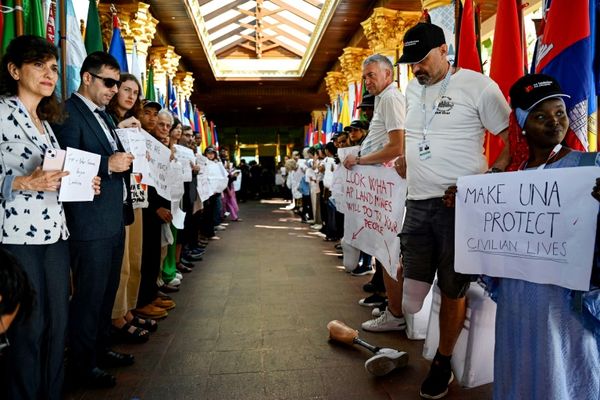WASHINGTON _ Hundreds of lucrative federal jobs are headed to the Kansas City area after the U.S. Department of Agriculture announced plans Thursday to relocate two research agencies to the region.
A two-state proposal from Kansas and Missouri beat out 135 other bids to become new headquarters for the Economic Research Service and National Institute of Food and Agriculture, two of the USDA's principal research agencies.
It's a major win for policymakers in both states, who worked closely on a collaborative bid, and a sign that the long-term border tensions on economic development may be easing.
"It was a united effort, so that really helped," Sen. Pat Roberts, R-Kan., the Senate Agriculture chairman, said earlier in the week before the USDA officially selected Kansas City over other finalists, locations in North Carolina and Indiana.
"I am committed to ensuring we continue to support and strengthen the research mission that our U.S. producers rely on. Kansas City is an obvious choice, as many other USDA agencies in the area partner closely with stakeholders," Roberts said in a statement Thursday.
The actual site for the relocation _ and on which side of the state line it will be _ is unclear at this point.
Sources say several spots may be in play. On the Missouri side, downtown possibilities include City Center Square; a Quality Hill building at Eighth Street and Pennsylvania Avenue where State Street Corp. operates; sublease space at Shook, Hardy & Bacon's offices near Crown Center; as well as offices in Crown Center itself.
In Kansas, the Sprint Campus and an office building in Lenexa's Renner Ridge Corporate Center are under consideration. The site of the proposed American Royal complex in Wyandotte County was offered up, but the USDA signaled a preference for existing office space.
Tim Cowden, chief executive of the Kansas City Area Development Council, described the research agencies as the "crown jewels" of the USDA. They were coveted by competing jurisdictions for the high paying jobs that would come with relocation.
"If I'm a farmer in Livingston County or a rancher in Miami County, I'm thrilled today because the agencies that have a direct impact on my livelihood are going to be located somewhere in the 435 loop, not in the Beltway in Washington D.C.," Cowden said.
Secretary of Agriculture Sonny Perdue informed employees at the agencies of the move Thursday morning. He said the relocation will save the USDA $300 million over 15 years and that state and local governments had offered $26 million in incentives to move to the region.
The savings would be steered into agricultural research, Perdue said.
"We did not undertake these relocations lightly, and we are doing it to enhance long-term sustainability and success of these agencies. The considerable taxpayer savings will allow us to be more efficient and improve our ability to retain more employees in the long run," Perdue said.
In a phone call with reporters later in the day, Perdue said the agencies would not disclose the incentives offered by state and local governments at this tie. "If the local community chooses to disclose those, they can do so at their will," he said.
Perdue said that Kansas City has proven itself as an agricultural hub and that the federal government already has a large presence. "This agriculture talent pool, in addition to multiple land-grant and research universities within driving distance, provides access to a stable labor force for the future," he said.
Perdue met with Sen. Jerry Moran, R-Kan., at USDA headquarters the day before Kansas City's selection was officially announced.
"I'm thrilled that USDA has selected Kansas City to house these critical research agencies," Moran said in a statement. "The animal health corridor, stretching from Manhattan, Kan., to Columbia, Mo., is the largest concentration of animal health companies in the world ... and today's decision further bolsters Kansas City's status as a national leader in the ag industry."
Perdue also had phone calls with Roberts, Sen. Roy Blunt, R-Mo., Missouri Gov. Mike Parson and Kansas Gov. Laura Kelly ahead of Thursday's announcement. Both governors were strong proponents of the move.
"These agencies will bring hundreds of good-paying jobs to the area and enhance Missouri's role as a national leader in ag research. Secretary Perdue made the right choice in selecting Kansas City, which is a great place to live and work," Blunt said.
"These research agencies do great work, and will be at the cutting edge of agriculture and well located for assistance and examples as they do their job."
The Trump administration has framed the relocation to the heartland as a way for the department to work more closely with farmers. But the plan is controversial in Washington where critics say the moves will hinder collaboration with other federal agencies and force long-time employees to uproot their families.
Employees at both agencies have voted to unionize in protest of the relocation plans and some senior researchers have said they will quit their jobs rather than move. Both agencies have been shedding employees in anticipation of the relocation.
The newly formed union representing ERS employees blasted Perdue for a lack of transparency and failure to heed their concerns.
"Secretary Perdue has stated that his rush to finalize the relocation is an attempt to limit the anxiety and burden on employees. In reality, his announcement today will bring nothing but further burden to the agency with an acceleration of the loss of mission critical staff and senior leadership who cannot or will not move to a new location," the union said in a statement.
The two agencies employ a combined 700 people. NIFA has a mission to invest in agriculture research and boasts a budget of roughly $1.5 billion, much of which goes to universities.
ERS is tasked with anticipating trends in food, the environment and the economy to enhance agriculture policy decisions.
Sen. Debbie Stabenow of Michigan, the top Democrat on the Senate Agriculture Committee, said she was concerned about the potential loss of expertise at the agencies that would be caused by relocation.
The American Statistical Association also panned the move, which opponents warn will hinder the agencies' ability to achieve their mission of nonpartisan analysis.
"Secretary Perdue is well on his way to dismantling a federal statistical agency that is one of the best agricultural economics research institutions in the world, having yet to provide a single justifiable reason for doing so. Today's decision is a big win for Kansas City and the immediate geographical area, but it comes at too great a cost for the nation," said Ron Wasserstein, the association's executive director.
"National policy is made in Washington, D.C. It is common sense that these ERS and NIFA, so vital to informing food and agriculture policy, should be located where national policy is made."
Rep. Emanuel Cleaver, D-Mo., said opponents have also raised concerns that the moves are part of an effort by the Trump administration to hamper climate change research at the agencies, but he dismissed these concerns.
"People have to understand that President Donald Trump has a limited amount of time in office," Cleaver said. "And whether it's another two years or 20, the reality is that USDA is going to eventually, as all federal agencies, respect the science on climate change."
House Democrats are pursuing legislation to block the move, but Cleaver and Rep. Sharice Davids, D-Kan., have been vocal supporters of the relocation. It puts them at odds with House leaders, who want to include language blocking the move in the agriculture budget bill.
An estimated 550 federal jobs will move to Kansas City as part of the relocation with salaries in the range of $80,000 to $100,000, according to Cleaver's office.
"All of the employees who are there now will be an offered an opportunity to move," Cleaver said. "And I've been saying to USDA and the USDA employees you will be rich in Kansas City ... You make $80,000 or $100,000 in Kansas City you are a rich human. And $80,000 here (Washington) gets you a studio apartment and no parking space."






